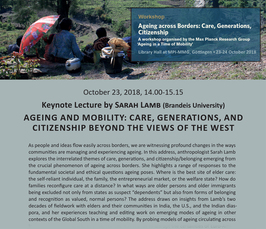"Ageing and Mobility: Care, Generations, and Citizenship beyond the Views of the West"
Keynote Lecture
- Datum: 23.10.2018
- Uhrzeit: 14:00 - 15:15
- Vortragende(r): Sarah Lamb (Brandeis University)
- Sarah Lamb is Professor of Anthropology at Brandeis University. Her research focuses on ageing, gender, families, ethical strivings, and understandings of personhood in India and the United States. Her books include: White Saris and Sweet Mangoes: Aging, Gender and Body in North India; Aging and the Indian Diaspora: Cosmopolitan Families in India and Abroad; and (as editor) Successful Aging as a Contemporary Obsession: Global Perspectives. She is the editor of the Rutgers University Press book series Global Perspectives on Aging.
- Ort: MPI-MMG, Hermann-Föge-Weg 11, Göttingen
- Raum: Library Hall

For more details please contact menster(at)mmg.mpg.de.
As people and ideas flow easily across borders, we are witnessing profound changes in the ways communities are managing and experiencing ageing. In this address, anthropologist Sarah Lamb explores the interrelated themes of care, generations, and citizenship/belonging emerging from the crucial phenomenon of ageing across borders. She highlights a range of responses to the fundamental societal and ethical questions ageing poses. Where is the best site of elder care: the self-reliant individual, the family, the entrepreneurial market, or the welfare state? How do families reconfigure care at a distance? In what ways are older persons and older immigrants being excluded not only from states as suspect “dependents” but also from forms of belonging and recognition as valued, normal persons? The address draws on insights from Lamb’s two decades of fieldwork with elders and their communities in India, the U.S., and the Indian diaspora, and her experiences teaching and editing work on emerging modes of ageing in other contexts of the Global South in a time of mobility. By probing models of ageing circulating across India, North America, and beyond, the address wishes to disrupt the certainties of Euro-American models. Lamb argues that the significance of ageing is not limited to the customary question of how to care for increasing numbers of dependent elderly as the world faces dramatic population maturation; rather, beliefs and practices surrounding ageing illuminate far-reaching social-cultural phenomena, including the cultural agendas behind national policies, intricate models of personhood, and profound social-moral visions of how best to live.